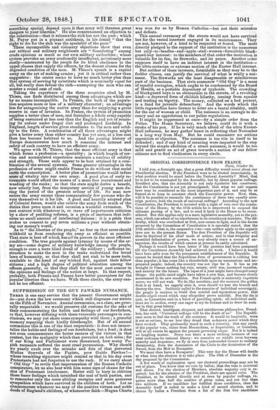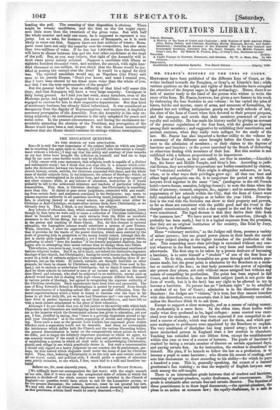ORIGINAL CORRESPONDENCE FROM FRANCE.
Path, October 26.
I told you, a fortnight ago, that a great difficulty would occur about our Presidential election. If the President were to be elected immediately, in what position would he stand before the National Assembly? Mind, that be is not to be nominated by the Assembly, but by direct popular suffrage. Recollect also, that the Assembly is not only legislative but constituent; that the Constitution is not yet promulgated; that what we call organic laws may be considered as the most important part of it, and may be so framed as to keep in constant check the Executive power. How, then, will it be possible to reconcile the coexistence of these two equally sove- reign powers, both the result of universal suffrage? According to the new Constitution, the President is invested with a right of veto over the resolu- tions of the House; by the 57th article he is empowered to suspend the ultimate passing of a law, and to send it back to the House to be recon- sidered. But this applies only to a mere legislative assembly, not to the pre- sent, which can admit of no interference in its constituent mandate. The dif- ficulty, which was overlooked at first, now comes to light, and in the decree proposed by the Committee of Constitution it is specially stated, that the 57th article—that is, the suspensive veto—can neither apply to the organic laws nor to the present House. The first President of the Republic will thus be deprived of his chief mode of action; and in that irregular and unsettled delimitation of powers, we may already trace a source of an- tagonism, the results of which cannot at present be safely calculated.
Perhaps it would have been better if the question had been postponed till the Constituent Assembly had achieved its work. I believe it would have been safer even for the permanent establishment of the Republic. It cannot be denied that the Republican form of government is nothing less than popular; it has come like a thunderbolt upon an unconscious and un- prepared people; indeed, the country was not ripe for it. It has as yet brought to France nothing but ruin, misery, civil war, increased taxation, and anxiety for the future. The lapse of a year might have changed many things: the public mind might have taken a new bias, and become slowly accustomed to its new condition. But French spirit is eminently impatiens mom; we will not wait. We do like novelties; and the moment the golden fruit is at hand, we eagerly seize it, even should we tear the branch and destroy the tree. Suddenly called to the exercise of individual sovereignty, the people is anxious to wield that untried and mysterious power, that double-edged sword which may altogether prove suicidal. But the die is cast, as Lamartine said in a burst of gambling spirit; all individual ambi tions are in motion, every one eager to try its fortune and to draw its num- ber in that great lottery. That shrewd, intelligent, eloquent, and mischievous philosopher, Proud- hon, has said, "Universal suffrage will be the death of us." The Republi- cans seem to feel the truth of the sentence. It would be laughable, were it not so serious, to see how they dread that unknown power which they have evoked. They professedly stand in such a minority, that any result of the popular vote, either from Monarchists, or Imperialists, or Socialists, will at all events be against the present governing clique. But it is indeed no laughing matter. Never was there a more striking instance of our total unfitness for rational liberty: we conceive no middle term between anarchy and despotism; we fly at once from unbounded licence to military dictatorship, from the domination of the Clubs to the domination of the Sword, from the Mob to Bonaparte. We must then have a Bonaparte! This very day the House will decide at what time the election is to take place. The 10th of December is the day proposed by the Commission. A few words of explanation upon our electoral proceedings may not be out of place. You know that we vote by ballot; that the vote is universal and direct. For the election of Members, absolute majority only is re- quired; but for the election of the President, there are special rules. The President, to be elected directly and at once by popular suffrage, re- quires more than half the number of given votes, and not less than two millions. If no candidate has fulfilled these conditions, then the Assembly itself is called to make a kind of second election, and to choose by ballot a President from a list of the first five candidates heading the poll. The meaning of that disposition is obvious. There might be twenty candidates, and the first on the list might repre- sent little more than the twentieth of the given votes. But with half the whole number and only one more, he is supposed to represent a ma- jority. Let us take, for instance, the name of Bonaparte, as it is most likely to come out first. Suppose there are four millions of voters: Bona-. parte must have not only the majority over his competitors, but also more than two millions of votes. If he has but 1,900,000, then the Assembly will have to choose between him and the four other candidates at the head of the poll. But, as you may believe, that right of the Assembly will in most cases prove merely nominal. Suppose a candidate with fifteen or eighteen hundred thousand votes, and another, the second, with eight hun- dred thousand or one million, do you think that the House would be jus- tified in putting the second over the first? It would be a signal for civil war. The rejected candidate would say, as Napoleon (the First) said once to his pseudo Houses, "Don't you know, and must I remind you, that I have been elected by ten times more votes than the whole of you, and that I am the true representative of the people!"
But the general belief is, that no difficulty of that kind will occur this time; and that Bonaparte will have a very large majority. Cavaignac is daily losing ground. As I told you last week, many members, even of the Moderate party, had agreed to support him as a candidate; some even had engaged to canvass for him in their respective departments. But that kind of missionary business has already failed beforehand. It was considered as derogatory from the dignity of Representatives; and moreover, it implied a necessary prorogation of the Assembly. Now, the Assembly is the only ex- isting authority; its continued presence is the only safegeard for peace and social order. In the present circumstances, and during the excitement un- avoidably attending the election of the President, any prorogation of the House would have been a real danger. It was then almost unanimously resolved that the House should continue its sittings without interruption.



























 Previous page
Previous page